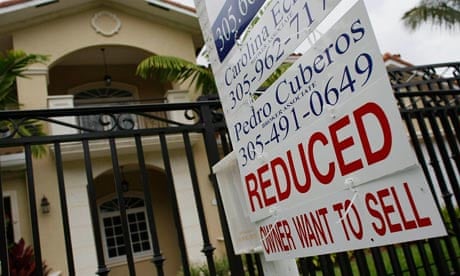WITH the Royal Wedding and a bonanza of bank holidays coming up, estate agent Mark Shore is hoping to be busy showing Brits the delights of Florida. For those with the cash it has never been cheaper to buy a holiday home in the sunshine state, with $150,000 buying you a four-bedroom house with a pool close to Disneyland. Before the property market tanked that home would have gone for twice that.
The US housing market has been on the slide for five years and there is no sign of an imminent recovery. Home ownership levels are now back at levels seen in 1998. Some economists are even worried that the US's may have fallen out of love with property ownership. It's as if the boom years never happened.
Shore's British Homes Group, based in Kissimmee, caters specifically for foreign buyers. Shore, a Briton, has been in Florida since 2003 and knows a lot of people who were burnt by the collapse, including himself: "A lot of people are very pissed off. A lot of people have just walked away."
There are signs that the market has bottomed, he says. There are fewer empty properties, and good ones sell quickly. But the boom isn't coming back anytime soon. "This has been the worst property crisis since the Great Depression, worse than the 1980s," he says. "You don't just bounce back from that."
Figures from the wider US housing market support Shore's thesis. Since 2006 $9 trillion has been wiped off the value of US homes, according to estate agency Zillow.com. By the end of last year 23.1% of US homeowners were in negative equity – that's 11.1m households – and a million people had had their homes repossessed.
Sales of new homes fell 11.2% between December and January this year and were 18.6% lower than 12 months earlier. In March, new homes sales rose slightly but prices continued to fall. Existing home sales increased 3.7% in March over February, according to data from the National Association of Realtors. The median price of a US home in March was $159,600, down nearly 6% on a year earlier.
Economists watch the number of new houses being constructed in a particular period, known as housing starts, for clues about the health of the market. Building anticipates demand. And builders are just as badly shaken as buyers. Housing starts hit a 27-year low in February, while building permits dropped to their lowest level on record, according to Commerce Department figures.
On paper housing looks like a bargain. Interest rates are low and prices are rock bottom – yet buyers are staying away and economists believe prices may fall even further. "You would have to go back to the Great Depression to find anything similar," says Paul Dales, US economist at Capital Economics. "It will recover at some point, but we are probably two or three years away."
High unemployment, the tightening of lending criteria by the banks and the fact that so many homeowners are in negative equity have undermined the foundations of the housing market, he says. "The top end of the market has done OK, but the bottom end is doing badly and I wouldn't be surprised if the top end sees a further drop off too."
Worst still, he believes the official numbers on the state of the US housing market may be 20% worse than they appear. The National Association of Realtors is currently reassessing its figures and they are not expected to be revised upwards.
Perhaps there is something else at work here, a deeper shift in America's attitude to home ownership. Dales believes there is hard evidence that Americans have fallen out of love with bricks and mortar. Historically Americans have not been as keen on home ownership as the British, he says. "In the boom, home ownership looked like a one-way bet – there was a greater incentive to get on the ladder. Now I think attitudes have changed." The new lows in homeownership may be here for some years to come, he believes.
Ken Goldstein, economist at The Conference Board in New York, agrees. And the longer the slump drags on, the more that relationship frays, he says. It's potentially very bad news for the wider economy as the housing market has been so vital to the US jobs market, says Goldstein. He calculates that half the jobs generated by small businesses were related to the housing market in the boom years, from the insurance agents selling protection and the people selling curtains to the builders laying foundations.
"Now we are rewiring the housing market – and it needs to be rewired if we are going to restart the Great American Jobs Machine," says Goldstein. But it's not going to happen soon. Foreclosures will continue to be a problem and the severity of the crash means "people who would once have been homeowners will remain as renters", he says.
The market will recover, he says, but the next generation of homebuyers are likely to be wary of getting in to the market: "It could be 10 years, maybe longer, before we see another big property boom. It's going to be a long time before people forget about this one."
